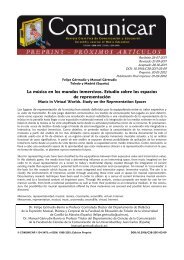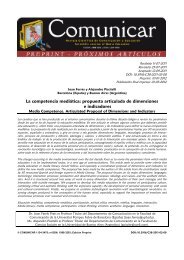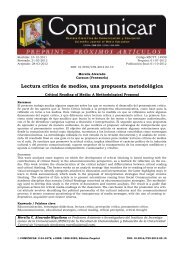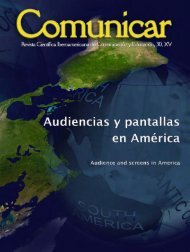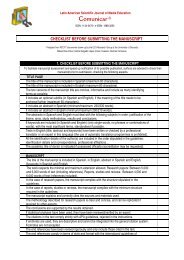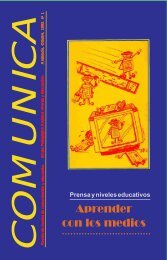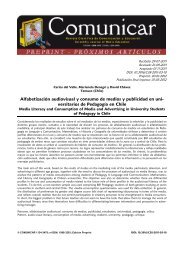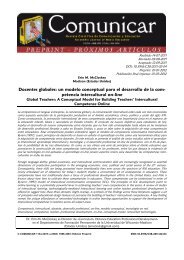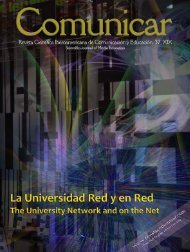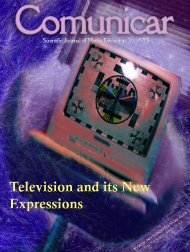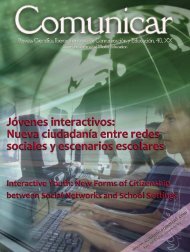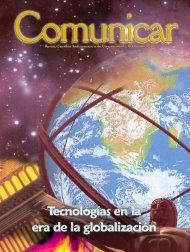Comunicar 39-ingles - Revista Comunicar
Comunicar 39-ingles - Revista Comunicar
Comunicar 39-ingles - Revista Comunicar
You also want an ePaper? Increase the reach of your titles
YUMPU automatically turns print PDFs into web optimized ePapers that Google loves.
D O S S I E Rl Vítor Reia-BaptistaFaro (Portugal)Received: 17-02-2012 / Reviewed: 09-03-2012Accepted: 28-03-2012 / Published: 01-10-2012DOI: 10.<strong>39</strong>16/C<strong>39</strong>-2012-02-08Film Literacy: Media Appropriations withExamples from the European Film ContextLa alfabetización fílmica: apropiaciones mediáticas con ejemplos de cine europeoABSTRACTThe increasing development of new multimedia materials as supporting vehicles of film languages has raised someglobal literacy questions and problems within teacher training. These new literacy problems pose a specific curricularquestion: How shall different media, social and cultural contexts approach the specific training of teachers (and,in fact, media makers) in order to address those global problems of a common film language with the correspondingcivic and curricular appropriations? The UNESCO MIL Curriculum for Teachers places media and informationliteracy at the core of lifelong learning for the acquisition of necessary civic competences within a universal perspective.A review of some European case studies helps us to understand some of the most contemporary interrelationsbetween the predominant multimedia messages and their communication channels and social networks, takingaccount of the preservation of the collective memory of sounds and images as a form of cultural heritage connectedto the audiovisual cultures of the world at large, since these processes never occur in geographical or cultural isolation.The aim of this article is to present the context of a possible inter-disciplinary and inter-cultural approach to aglobal film literacy process, taking some interesting European case studies that appeared in «<strong>Comunicar</strong>, 35» as astarting point.RESUMENEl creciente desarrollo de nuevos materiales multimedia como apoyo al lenguaje fílmico ha promovido y generadoalgunos interrogantes y problemas en torno a la necesaria alfabetización global, así como nuevas perspectivas en laformación de los docentes. Así han surgido nuevos interrogantes sobre el currículum en medios: ¿cómo sintonizar laformación específica de los docentes con la dinámica diaria de los diversos medios de comunicación en contextosculturales diversos, con el objeto de aproximar los problemas globales a un lenguaje cinematográfico común, poseedorde apropiaciones cívicas y curriculares contemporáneas? El Curriculum MIL de la UNESCO (Media andInformation Literacy), destinado a la formación del profesorado, sitúa la alfabetización mediática e informacional enel centro del aprendizaje a lo largo de toda la vida, así como en la adquisición de las competencias cívicas necesariasdesde una perspectiva universal. Este trabajo plantea el análisis de algunos estudios de caso europeos para comprenderlas actuales interrelaciones entre los mensajes multimedia predominantes, sus canales de comunicación y lasredes sociales, teniendo muy presente la importancia de la conservación de la memoria colectiva de sonidos, imágenes…como patrimonio cultural conectada con las diversas culturas del mundo, y sabiendo que estos procesos jamásocurren geográfica y socialmente aislados. En esta propuesta se avanza un posible modelo interdisciplinario e interculturalpara una alfabetización fílmica global, partiendo de estudios fílmicos de casos europeos, seleccionados delas aportaciones de «<strong>Comunicar</strong>, 35».KEYWORDS / PALABRAS CLAVEFilm languages, media literacy, civic appropriations, European collective audiovisual memory, film culture, newmedia.Lenguaje fílmico, alfabetización mediática, apropiaciones cívicas, memoria colectiva europea audiovisual, cultura decine, nuevos medios.v Dr. Vítor Reia-Baptista is Professor Coordinator of the Department of Communication, Arts and Design in the Schoolof Education and Communication and Researcher in the Research Centre for the Arts and Communication at theUniversity of Algarve (Portugal) (vreia@ualg.pt).<strong>Comunicar</strong>, n. <strong>39</strong>, v. XX, 2012, Scientific Journal of Media Education; ISSN: 1134-3478; pages 81-89www.comunicarjournal.com



